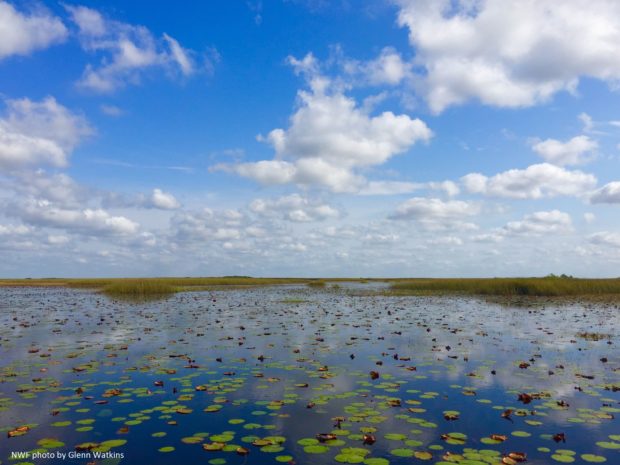We have much more to do and your continued support is needed now more than ever.
How Congress Can Transform Water Resources Planning

America’s Everglades are home to many endangered and threatened species, including the Florida Panther, West Indian Manatee, and Snail Kite. These grassy waters once flowed freely from headwaters above the Kissimmee River to Lake Okeechobee, spilling south over the lake’s brim and pouring finally into Biscayne Bay, the Ten Thousand Islands, and Florida Bay.
Almost as soon as Florida became a state, people began engineering the landscape with the intent to drain and manipulate it for agriculture and development. Unfortunately, short-sighted construction of dams and canals severed the natural flow of the lifeblood of the Everglades ecosystem – water. And now we’ve spent decades trying to reverse the economically and environmentally destructive engineering that has starved the Everglades of water.

This problem is not unique to South Florida. Many places in the country are now working to restore the damage created by misguided efforts to drain wetlands and control rivers. Even more troubling, the United States Army Corps of Engineers continues to develop and operate projects in a way that adds to this damage. Corps projects and project operations continue to destroy our wetlands, rivers, and floodplains – natural systems that protect communities from floods, provide clean drinking water, and are critical wildlife habitat. Destructive water management practices further endanger freshwater species, which are the most imperiled group of fish and wildlife in the U.S.
But there is another way. The Army Corps could fulfill their flood protection, navigation, and ecosystem restoration missions using approaches that minimize harm to the environment. And Congress should make the Corps do so.
Congress uses the Water Resources Development Act (WRDA) to shape Army Corps policy and authorize major water projects. This bill is typically passed every few years, and has a massive impact on wildlife that depend on healthy rivers, floodplains, and wetlands.
The Senate Environment and Public Works Committee recently marked up its version of WRDA 2016. On the plus side, this bill would authorize the Central Everglades Planning Project. CEPP is an important effort to make the Everglades function more like it did historically, by sending more water south to the Everglades, instead of flushing too much polluted freshwater into the St. Lucie and Caloosahatchee estuaries. This comes at a critical time for Everglades restoration since Florida Bay is experiencing a disastrous seagrass die off, clouding the Bay’s famously clear blue waters and threatening its $1.2 billion sport fishing industry. This WRDA would also authorize efforts to restore the Los Angeles River ecosystem. Additionally, it lays groundwork to remove dams along the Green and Barren Rivers and authorizes efforts to improve drinking water quality in cities with aging infrastructure like Flint.

However, despite the important restoration efforts authorized in this bill, the legislation passed by the Senate Committee overlooks a huge opportunity to modernize the way we manage our water resources. Congress should enact the common sense and cost-effective reforms outlined below to ensure we don’t cause more harm going forward. It’s a chance Congress can’t afford to miss.
- Require use of cost-effective, low impact nonstructural and restoration solutions where they can provide an appropriate level of protection and benefits.
- Modernize management of water projects by requiring the Corps to update operating plans and water control manuals for large-scale Corps projects at least every 10 years.
- Utilize federal and state expertise by requiring evaluation and mitigation of fish and wildlife impacts consistent with Fish and Wildlife Coordination Act recommendations.
- Modernize emergency flood recovery efforts by allowing use of emergency flood response funds for levee setbacks and other low impact solutions that increase public safety.
- Improve planning and transparency by making water resources planning data and policy guidance available to the public.
The Corps needs to fundamentally change the way it manages our nation’s waters. It doesn’t make sense to continue to use the same old approaches that have caused so much destruction when common sense changes would reduce costs, save lives, and better protect our waters and wildlife.
Adopting these reforms would help prevent the need for future extensive restoration efforts, like those underway in the Everglades, to fix broken systems. Let’s not make the same mistake twice.
Retweet the following tweet to show your support for the Everglades:
Next water resources bill needs to protect #Everglades & include common-sense reforms #WRDA https://t.co/IazruRDQqe pic.twitter.com/vlLnK0EARW
— NWF Water (@NWFwater) May 10, 2016





















